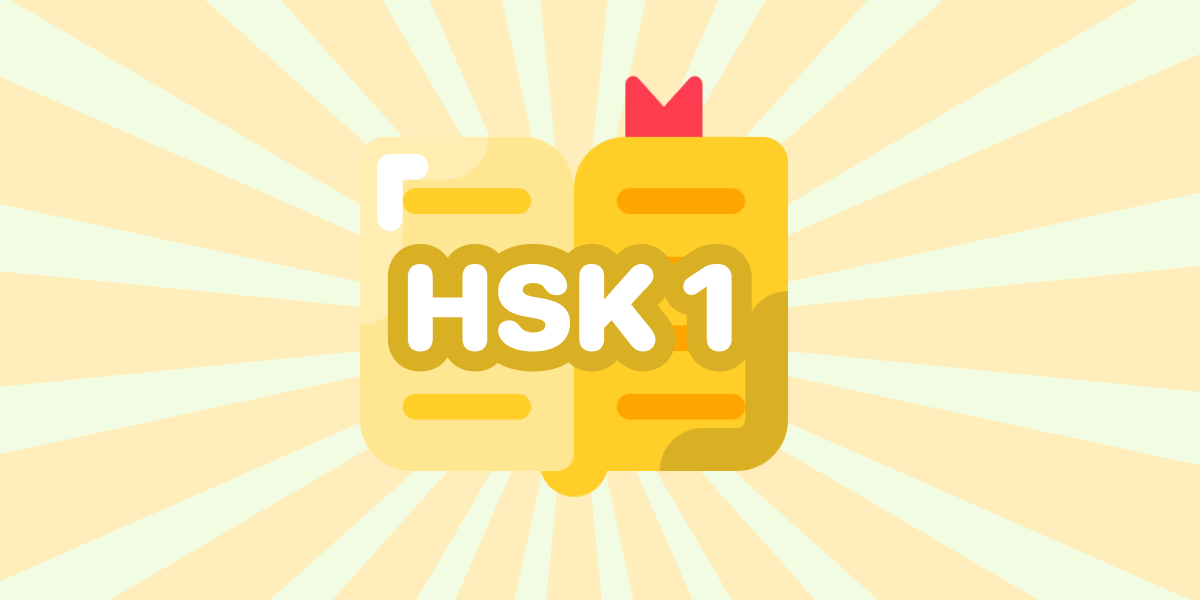HSK 1 words with confusing tones — Pay attention to these similar-sounding words!
HSK 1 may be the lowest rung on the Chinese proficiency ladder, but don’t dismiss it as a piece of cake.
One particularly tricky thing about HSK1 (and Chinese in general): there are many words with the same syllable but different tones that could trip you up.
For example, can you tell the difference in pronounciation between the 杯 in 杯子 and the 北 in 北京? Both are written as “bei”, but they have different tones and completely different meanings.
If you don’t speak a tone-based language, you’ll want to pay special attention to these words, and practice their tones.
I’ve combed through the entire list of HSK 1 vocabulary to pick out 19 groups of similar-sounding words. For each group, I’ve included an example sentence so you can learn to hear the difference in tones in context.
Let’s dive in!
1. Ba: 八 vs 爸
八 bā
爸爸 bà ba
Example: 爸爸有八块钱。
Dad has eight dollars.
2. Bei: 杯 vs 北
杯子 bēi zi
北京 běi jīng
Example: 这是我从北京买的杯子。
This is the cup I bought from Beijing.
3. Da: 打 vs 大
打电话 dǎ diàn huà
大 dà
Example: 大家可以打电话给他。
We can call him.
4: 点 vs 电
点 diǎn
电视 diàn shì
Example: 我想看一点电视。
I want to watch a bit of TV.
5. Er: 儿 vs 二
儿子 ér zi
二 èr
Example: 她的儿子今年二十岁。
Her son is twenty years old this year.
6. Hao: 好 vs 号
好 hǎo
号 hào
Example: 给我你的电话号码,好吗?
Give me your phone number, alright?
7. Hui: 回 vs 会
回 huí
会 huì
Example: 你会回家吗?
Will you go back home?
8. Ma: 吗 vs 妈
吗 ma
妈妈 mā ma
Example: 这是妈妈的吗?
Is this mom’s?
9. Ming: 名 vs 明
名字 míng zi
明天 míng tiān
Example: 明天我把名字写给你
I’ll write the name for you tomorrow.
10. Na: 哪 vs 那
哪 nǎ
那 nà
Example: 哪个人?是那个吗?
Which person? That person?
11. Qian: 前 vs 钱
前面 qián miàn
钱 qián
Example: 前面的座位五十块钱。
The seat in front costs fifty dollars.
12. Ren: 人 vs 认
人 rén
认识 rèn shi
Example: 你认识这个人吗?
Do you know this person?
13. Shang: 商 vs 上
商店 shāng diàn
上 shàng
Example: 楼上有商店。
There are shops upstairs.
14. Shi: 十 vs 时 vs 是
十 shí
时候 shí hou
是 shì
Example: 已经十点了,是时候回家了。
It’s already ten o’ clock, it’s time to go back home.
15. Shui: 水 vs 睡
水果 shuǐ guǒ
睡觉 shuì jiào
Example: 你要吃水果还是要睡觉?
Do you want to eat fruit or to sleep?
16. Xian: 先 vs 现
先生 xiān sheng
现在 xiàn zài
Example: 先生,请问现在几点。
Sir, what is the time now?
17. Xie: 些 vs 写 vs 谢
些 xiē
写 xiě
谢谢 xiè xie
Example: 你能写些东西给他吗?谢谢。
Can you write something for him? Thanks.
18. Yi: 一 vs 医 vs 衣 vs 椅
一 yī
医生 yī shēng
衣服 yī fu
椅子 yǐ zi
Example: 一张椅子、一件衣服、一位医生。
A chair, a shirt, a doctor.
19. Zuo: 昨 vs 做 vs 坐
昨天 zuó tiān
做 zuò
坐 zuò
Example: 他昨天坐在椅子上做功课。
He sat on the chair doing his homework yesterday.
 Kai Loh
Kai Loh
